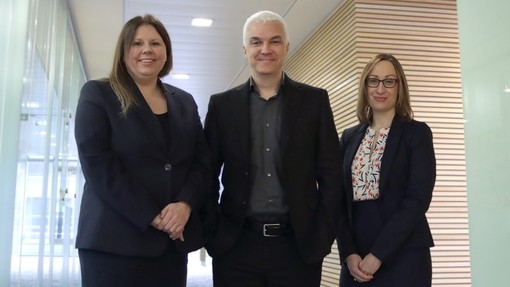Divorce in best interests?
Hill Dickinson acts in first reported judgment before Mr Justice Hayden

Divorce in best interests? - Hill Dickinson acts in first reported judgment before Mr Justice Hayden
The recent decision of D -v- S [2023] EWCOP 8 / [2023] EWFC 23 has provided a welcome opportunity for consideration of whether a divorce can be pursued in an individual’s best interests. Joanna Crichton, Legal Director in our Healthcare and Public Law team, represented D’s litigation friend in the Court of Protection proceedings whilst Sarah McCarthy, Senior Chartered Legal Executive in our Family Team represented D’s litigation friend in the Divorce proceedings.
The judgment of Mr Justice Hayden – who stepped down from his role as Vice-President of the Court of Protection in February 2023 – is believed to be the first reported judgment on this topic.
Background
D and S – husband and wife respectively - were married in 1998 and subsequently had two children. By 2006, there were noted to be considerable strains within the marriage. At this time, D was living separately from S and took an overdose which resulted in a significant brain injury.
In 2007, S petitioned for divorce on the grounds of adultery. By 2009, S had also pursued an order for financial remedy against D.
These proceedings were initially stayed as D did not have a Court Appointed Deputy who could conduct divorce proceedings on his behalf. As a result, an application was made for the Official Solicitor to act for D. Unfortunately, no security of costs was provided to the Official Solicitor and D remained unrepresented.
In 2016, S issued a supplemental petition for divorce, on the grounds that her marriage with D had broken down irretrievably and that they had been separated for a continuous period amounting to at least five years. In 2019 D agreed to the dismissal of the petition issued by S, putting her on notice of his intention to lodge his own petition due to the lack of progress being made. S’s petition was subsequently withdrawn.
In July 2019, D issued his own application for divorce on the same grounds as S; being irretrievable breakdown following separation for at least five years.
Notwithstanding her earlier petitions, S defended D’s application and stated that the parties’ separation was as a result of D’s ill health and lack of capacity to litigate. She also challenged D’s capacity to declare that the marriage had irretrievably broken down. S also opposed D’s brother being his litigation friend due to his financial interest in the family company.
S’s objections appeared to stem from a belief that she, or indeed her children, would be financially disadvantaged should D pursue a divorce. Throughout the course of proceedings, both S and her son ‘P’ had raised concerns relating to the way in which D’s siblings – co-directors of a business that both S and D had shares in – were managing that business. S and P appeared to believe that D’s siblings may be attempting to circumvent D’s shares in some manner. These proceedings did not seek to establish the veracity of any such allegations further.
In 2021, a long-term friend of D, ‘F’ put himself forward as litigation friend for D in divorce proceedings. Given that all parties agreed that D’s petition for divorce may have been made at a time when he lacked capacity to make that decision or conduct proceedings, F (following advice from and experienced London junior Counsel and two London based Leading Counsel) subsequently issued an application in the Court of Protection for determination on D’s capacity and best interests.
Court of Protection/Divorce proceedings
Capacity
Reports were received from D’s neurorehabilitation consultant assessing D’s cognition as a result of his brain injury. At the time of the hearing, D’s brain injury was noted to be severe, meaning that he could not answer simple and direct questions nor follow simple requests. D’s capacity to communicate was described as being ‘extremely limited’ with no ability to weigh, retain or balance information that was given to him across a range of health, welfare and financial matters.
As a result, Mr Justice Hayden was clear that ‘all but the most rudimentary decisions are now beyond [D]’ [24], declaring that he lacked capacity to make decisions relating to any divorce.
Best Interests
The Court heard substantial evidence from D’s litigation friend, F, during the course of the final hearing in this matter. F shared that, in the months before D’s overdose, neither D nor S appeared to wish to reconcile following their separation; their lives were very much separate. Further, there had been a total lack of contact between D and S for well over a decade. Mr Justice Hayden also spent a significant period of time questioning F relating to the type of man that D was and activities that he had enjoyed in an attempt to better understand D’s personality and therefore his likely wishes and feelings.
The Court was also informed that D had been visited by his former solicitors on numerous occasions between 2008 – 2017 following the initial petitions for divorce made by S. In the years following D’s overdose, it was noted that his cognitive functioning was better than it was at the date of the current Court of Protection and Divorce proceedings. Attendance notes from these meetings were submitted in evidence and detailed that D was clear and consistent in his beliefs that he wanted a divorce, but that he would contest any allegations of adultery made by S. One such attendance note from 2008 detailed that the solicitors visited by D were of the opinion that D did have capacity to give instructions in this regard, although this was not assessed and therefore this evaluation could not be relied upon in the current proceedings. However, Mr Justice Hayden stated that he was ‘ultimately confident’ that they reflected D’s truly held views [28].
In reaching his judgment, Mr Justice Hayden noted that the lives of D and S’s children had been ‘characterised by conflict’ [30] given the length of proceedings. Despite the opposing views of D and S, Mr Justice Hayden was satisfied that they were ‘plainly united’ in their love and commitment to their children, wishing to promote their children’s future welfare in ‘every conceivable way’ [29].
Further, Mr Justice Hayden was satisfied that granting a decree nisi within the Divorce proceedings would move the ‘unhappy family at least one step forward towards ending [this] conflict’. As such, and having considered D’s wishes and feelings as described above in satisfaction of section 4 of the Mental Capacity Act 2005 (‘MCA’), Mr Justice Hayden stated that he had come to the ‘very clear’ [30] conclusion that granting a decree nisi – a declaration that a marriage has broken down granted in advance of obtaining a decree absolute (which formally ends the marriage) – was in D’s best interests.
Comment
Those with knowledge of the Mental Capacity Act 2005 (MCA_ may be familiar with section 27 – which states that no part of the MCA permits a decision to be made on behalf of another person in relation to a number of domains, perhaps most notably consenting to marriage or sexual relations.
Section 27(1)(c) also states that no decision may be made under the MCA in an individual’s best interests to consent to a decree of divorce being granted on the basis of two years’ separation.
However, as previously stated, D’s petition for a decree nisi was based on the assertion that his marriage with S had broken down irretrievably on the ground that they had been separated for at least five years. As such, the application to the Court of Protection for a declaration on D’s best interests did not fall within the list of excluded decisions contained within section 27.
The judgment in this matter is of note in and of itself, being – we believe - the first reported case on divorce in an individual’s best interests.
Mr Justice Hayden’s diligence in presiding over this matter was commendable – specifically the lengths that he went to in order to fully understand D’s character prior to his brain injury and the great care with which he dealt with evidence from D’s son, P. Mr Justice Hayden placed great weight upon the regard that both D and S held for their children as well as the impact that protracted proceedings were having upon all involved. Court proceedings, in one form or another, had existed for much of the lives of both children and Mr Justice Hayden was clear that resolution had ‘been avoided for far too long’ [30]. Further, Mr Justice Hayden was satisfied that to ‘further to continue the status quo, would, ultimately, risk demeaning all involved’ [29]. This empathetic approach, placing D and those close to him at the heart of decision-making through thorough, careful analysis and application, is proof of the MCA in action as it was intended at its inception.
Our Healthcare and Public Law team has extensive experience in advising on matters relating to the MCA and providing representation in the Court of Protection. Should you have any queries in relation to this specific case, or in relation to the MCA / Court of Protection more widely, please do not hesitate to get in touch.
Our Family Team has extensive experience in Divorce and resulting Financial Remedy matters as well as private child law and marital agreements. Should you have any queries relating to family law, please do not hesitate to get in touch.






